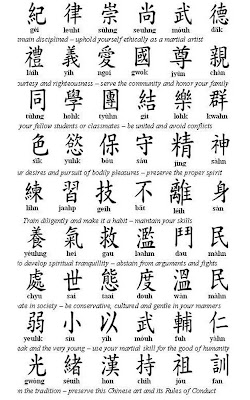The Shaolin Code is an ancient code of ethics taught to all Shaolin monks. This code is great for a marital artist, but also great for a Buddhist. With a little tweak of the words, it perfectly matches what every Buddhist should live by. I'll give the original translation, then the "tweaked" version so you can see the connection for yourself.
Original:
Remain disciplined: uphold yourself ethically as a martial artist.
Courtesy and righteousness: serve the community and honor your family.
Respect your fellow students: be united and avoid conflicts.
Curb your desires and pursuit of bodily desires: preserve your proper spirit.
Train diligently and make it a habit: maintain your skills
Strive to develop spiritual tranquility: abstain from arguments and fights.
Coordinate in society: be conservative, cultured and gentle in your manners.
Protect the weak and very young: use your martial skill for the good of humanity
Maintain the tradition: preserve this Chinese art and its Rules of Conducts.
Now with a little adaptation to this code, here's how I believe it connects to Buddhism with only a little switch of the terms.
"Buddhist Version":
Remain disciplined: uphold yourself ethically as a Buddhist. (uphold the precepts)
Courtesy and Righteousness: Serve the community (Sangha and all beings) and honor your family (teachers/lineage)
Respect your fellow students: be united and avoid conflicts (not much else needs to be changed here- learn from each other and keep an open mind)
Curb your desires and pursuit of bodily pleasures: preserve your proper spirit (again, not much needs changing here- keep the precepts and preserve your path of the Way)
Train diligently and make it a habit: maintain your skills (Continue your practice and meditation regularly, make it a part of you)
Strive to develop spiritual tranquility: abstain from arguments and fights. (Keep a tranquil mind and practice compassion)
Coordinate in society: be conservative, cultured and gentle in your manners. (Compassion again plays a major role here, also, teach people on their various levels)
Protect the weak and very young: use your martial skill for the good of humanity (The practice is Buddhism is for all beings, we don't only practice for ourselves)
Maintain the tradition: preserve this Chinese art and its Rules of Conducts. (Teach those who do not know the Way and uphold its precepts diligently)
Gassho
Showing posts with label Mahayana. Show all posts
Showing posts with label Mahayana. Show all posts
Tuesday, October 11, 2011
Saturday, February 12, 2011
Why Divide When You Can Add?
Lately, I've been focusing a lot of time on reading a variety of Buddhist literature and scriptures from different traditions. I used to think I was purely a "Zen" Buddhist, but the more I read from the other traditions and sects, I am confronted with this thought:
All of the Buddhist traditions have many lessons and valuable practices. Why choose only one? Why divide when you can add?
Honestly, I cannot choose only one. I have learned so much from studying all of them. Some of the practices are different, sure, but I think all of them holds a piece of the pie to crossing to the other shore.
Do you think the Buddha divided his enlightenment into sects? Of course not.
I'm sure language and culture most likely play a role in the early development of Buddhism and the different traditions, but I think it's more important to learn everything we can from all of the different traditions. It's the 21st century. We have access and ability. We can order books that have been translated from other languages in other lands, ride airplanes to go on retreats to other places, visit monasteries, etc.
There is only one Dharma. And many paths may lead the way. With so many traditions holding such an abundance of wisdom, why wouldn't you want to take advantage of all of them? There are the similar key points of course, (Four Noble Truths, Noble Eightfold Path, etc), but the different sects and interpretations can have distinct meanings and advice which others may not possess.
It is not my desire to push beliefs upon you. I only wanted to share my ideas on the subject. My main point is, if the knowledge is there for the taking, why not grab it? And I appreciate all of the traditions, otherwise we wouldn't have such a vast array of teachings.
So what do I call myself? A Buddhist, A Disciple of the Dharma.
I guess it's the colors that make everything beautiful. Amituofo
All of the Buddhist traditions have many lessons and valuable practices. Why choose only one? Why divide when you can add?
 | |
| Division of Buddhist Traditions |
Do you think the Buddha divided his enlightenment into sects? Of course not.
 | |
| Theravada Monks |
There is only one Dharma. And many paths may lead the way. With so many traditions holding such an abundance of wisdom, why wouldn't you want to take advantage of all of them? There are the similar key points of course, (Four Noble Truths, Noble Eightfold Path, etc), but the different sects and interpretations can have distinct meanings and advice which others may not possess.
 |
| Tibetan Monks |
So what do I call myself? A Buddhist, A Disciple of the Dharma.
I guess it's the colors that make everything beautiful. Amituofo
Labels:
Buddhism,
Enlightenment,
Mahayana,
Philosophy,
Theravada,
Zen



